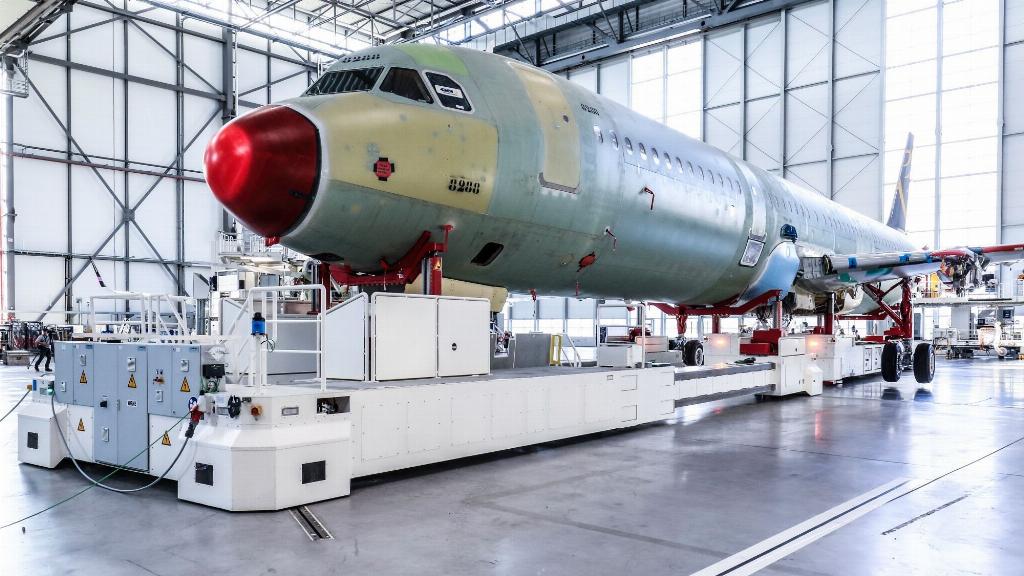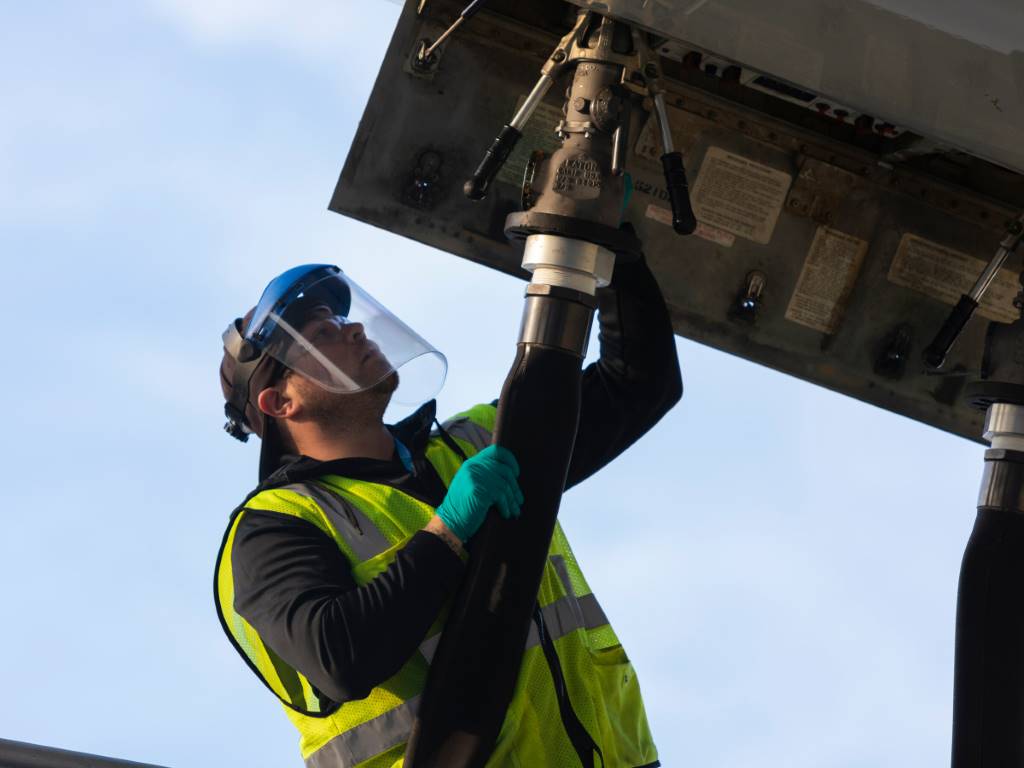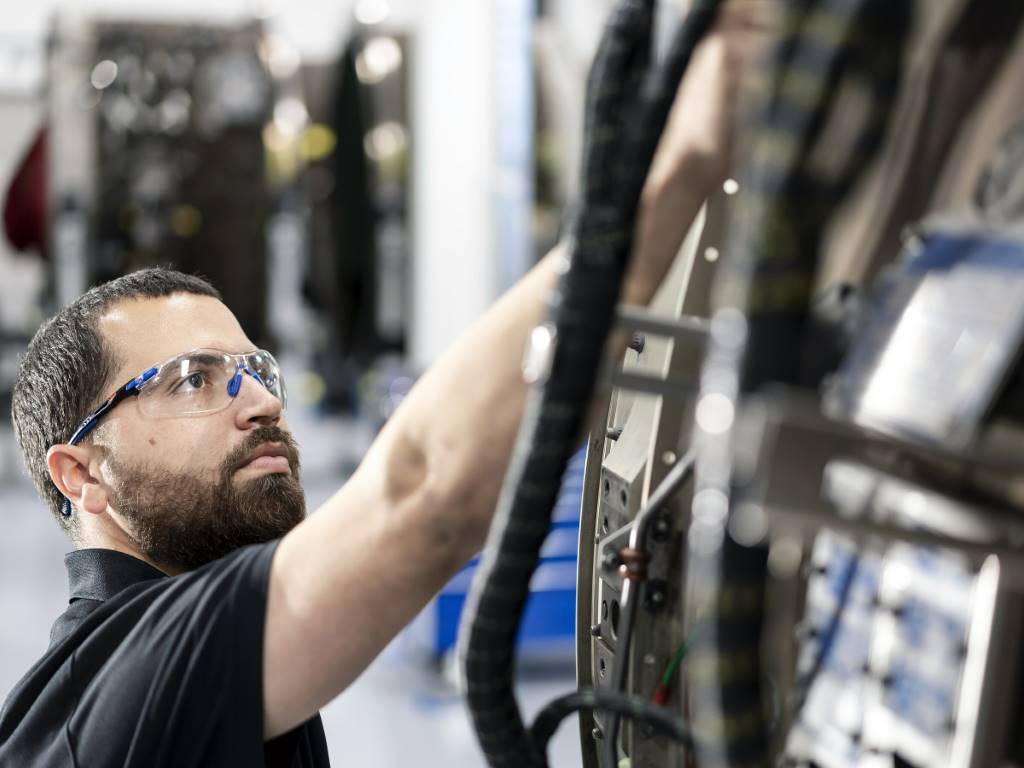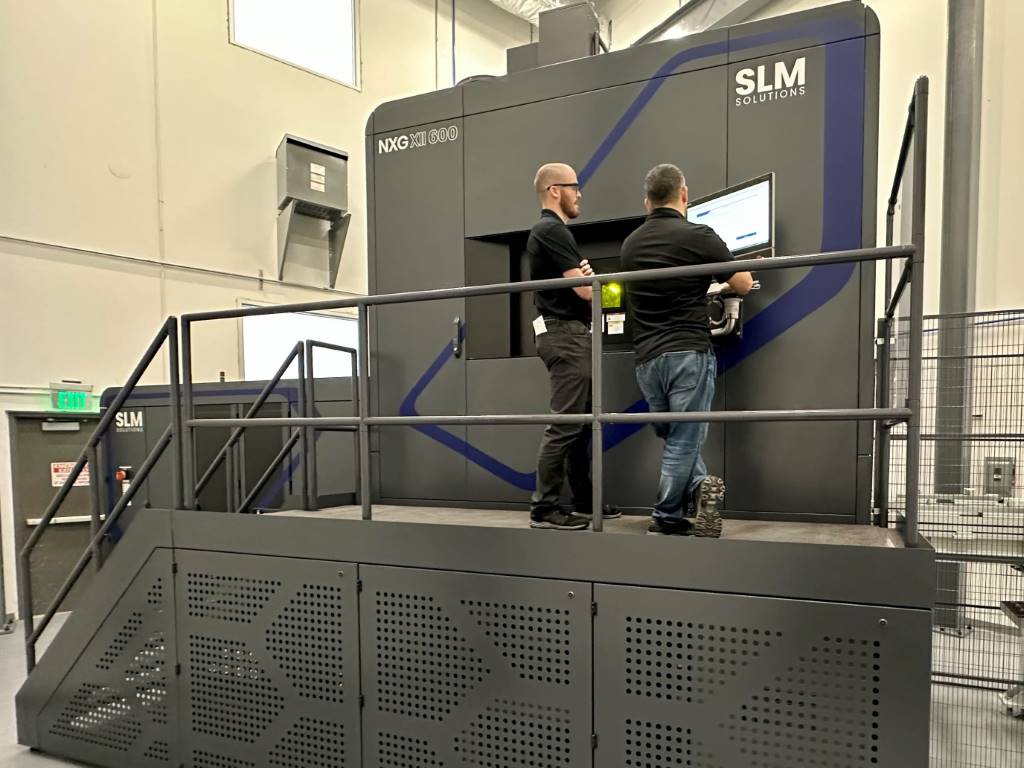Progress is not straightforward

A digital aircraft manufacturing and an assembly line that is no line at all is expected to deliver a substantial jump in Airbus A320 and Airbus A350 production. Robert Coppinger reports.
Too much work is a nice problem to have and for Airbus it presents a challenge to increase productivity at its final assembly lines and throughout the supply chain to meet that demand.
The European aerospace giant is aiming to ramp up the monthly output of its A350 XWB to 10 by 2019 and for its A320 Family add another 10, six months later, for 60 new builds a month. In the first half of 2018, 239 A320 family and 40 A350 XWBs were delivered, out of a total of 303 aircraft. If Airbus achieves its goals, in the first half of 2020 it should be delivering 360 A320 Family and 50 XWB. For the A320 there is also an intention to achieve 70 per month and a feasibility study is underway for that.
The ramp up is necessary because Airbus has more than 6,000 A320 current engine option (CEO) and A320 new engine option (NEO) family aircraft to deliver out of the 14,000 plus that have been ordered to date. The ramp up will also help Airbus recover from the A320neo delivery delays it suffered due to slow engine supply. For the A350, 890 have been ordered with delivery backlogs of 534 for the A350-900 type and 163 for the larger A350-1000 version, according to Airbus’ August 2018 orders and deliveries spreadsheet.
In a presentation to investors in July of this year, Airbus made it clear that 2018 was focused on deliveries, solving the A320neo engine situation, ramping up the A350 and A320 production and improving the supply chain to secure the productivity rise needed. Digital tools for productivity improvement were also cited. In its half year results Airbus also stated that: “Engine manufacturers are working to meet their commitments and resources and capabilities have been mobilised internally. A recovery plan is in place and the number of stored aircraft [due to the engine supply issue] has started to decline from the end of May peak, but risks remain.”
In its half year 2018 results statement, given on 26 July, Airbus chief executive officer, Tom Enders, is quoted saying: “A320neo aircraft deliveries picked up during the second quarter but challenges remain to meet our full year targets... Our operational focus in commercial aircraft remains squarely on securing the production ramp-up.”
The path to achieve these ramp ups has begun with the fourth A320 final assembly line (FAL) that has been opened at Airbus’ Hamburg, Germany factory. Hamburg’s four FALs for the A320 family produce all four variants, the A318, A319, A320 and the A321 along with their CEO and NEO versions. In its 14 June 2018 announcement for the inauguration of Hamburg’s fourth FAL, Airbus commercial aircraft president, Guillaume Faury, said: “The inauguration of our latest, most modern A320 production line opens a new chapter in efficient, digital aircraft manufacturing.” He added: “With these new technologies we are building our aircraft more efficiently, a key enabler for higher production rates.”
That June, the Hamburg FAL inauguration statement also stated: “The new technologies and processes applied in the new line were designed and implemented in close coordination with employees and following the principle of Design Thinking.” Airbus was not available to explain what Design Thinking is.

Automating a ramp up
Airbus stated in its FAL factsheet that Hamburg’s fourth A320 assembly line, “sets new standards in the Airbus industrial system by introducing automation technology.” It goes on to describe the FAL as having a, “clean-floor concept with mobile tooling platforms and full-motion work stations,” which make the FAL flexible. It is the first Airbus line to get two automated 7-axis robots for circumferential joints, pre-drilling, drilling, countersinking and rivet positioning. As well as robots, simpler improvements include, delivery of materials close to the worker, digital production control systems and improved worker ergonomics.
The delivery of materials, Airbus explains, includes ensuring that all the necessary materials at a work station are placed, unpacked, within three metres of where the worker will mount them. The Hamburg fourth FAL also uses what Airbus describes as dynamic measurement assembly where laser trackers help the positioning of the platforms in the hangar for easier assembly of the fuselage and its major components, such as the vertical tail plane and wing.
In its fact sheet, Airbus highlights the changes at each of the stations in its fourth FAL. At stations 42, 43 and 44, where the main landing gear, pylon preparation and other activities take place there is an automated nose landing gear loader and engine pylon loader. Station 41, where the parts of the fuselage are joined up, has automated movement between stations on mobile tooling platforms and the robotic drilling, countersinking and rivet positioning of the forward and aft fuselage sections with the two seven-axis robots. At the wing installation station, station 40, the fuselage and wings are moved again by mobile tooling platforms and the aforementioned dynamic measurement assembly method is used.
At stations 35 and 25 where cabin installation takes place, Airbus said that a digital production control system is employed for the tasks that include cabin lining and carpet installation, hydraulic and cabin pressure testing and the rigging of the horizontal tail plane. For the stations 23 and 17 where seat installation and man landing gear testing, among other activities, occurs Airbus does not specify any changes. But, for stations 21 and 17, where the engines are installed and final tests for the aircraft take place, there is an electronic toolbox system.
Airbus assembles, tests and delivers A320 family aircraft in Hamburg, Toulouse, Tianjin in China and Mobile in the USA. The ramp up from 50 to 60 will need all four factory’s output along with all four of Hamburg’s FALs.
Airbus said: “That [Hamburg fourth FAL] is a pilot project and the robots that their using for the automation could be deployed across the company on the FALs.” This indicates that the A350 FAL would use the A320neo FAL production technologies, but Airbus was not available to comment on how it intends to achieve the output increase for the XWB.
The ramp up will also require productivity improvements at other Airbus facilities and suppliers. In Airbus’ news announcements for this year’s Farnborough Airshow it highlighted the firm’s Broughton, UK factory trialling an autonomous mobile robot. Referring to this as an example of, “manufacturing systems digitalisation,” it stated that a six-month shopfloor trial was, “underway”. This trial was for a small autonomous, “vehicle designed to handle and transport small aircraft components and assembly tools around the factory”. The robot was funded by a UK-government collaborative research project. “In the future,” Airbus stated, “the capabilities of such vehicles will be developed further to allow automated handling of large components within the factory. In addition, the technology could eventually be rolled-out across other Airbus sites.”
In June this year, Wirral-based Teledyne CML Composites announced that it had won a contract with Airbus for composite wing components and assemblies supply for the A350. In its announcement, CML refers to the ramp up, it stated: "Airbus is working to increase production and looking to their supply chain to support the increased demand." The firm’s general manager, John Toner, is quoted as saying: "We invested heavily in a new autoclave to allow us the capacity to meet the current build rates and planned ramp up."
Another key part of the supply chain that will maintain the ramp up is Airbus’ new Beluga, the Beluga XL oversize airlifter. On 19 July this year the aircraft made its first flight which started a 10-month 750-flight certification campaign. Built using the Airbus A330-200 Freighter structure, it provides more capacity compared to the original Beluga that was built upon the Airbus A300-600 Super Transporter. The first flight, which took place over Toulouse, France, lasted for four hours and 11 minutes.

Digital manufacturing
Software is a key part of this digital aircraft manufacturing and Airbus has created what it calls Skywise. Connecting the manufacturers with its customers and suppliers, data is shared via Skywise. Launched as an open data platform at the 2017 Paris Air Show, in July of this year, Airbus announced it was extending Skywise to the supply chain.
Later, in its August 2018 statement on Skywise, Airbus stated that the data platform: “[is] enabling unprecedented improvements in the reliability, quality and performance of suppliers. Since late last year, the company has been working with selected suppliers during an early adopter phase to evaluate features and functionalities.” It described these early adopters as being cabin, propulsion, aerostructures, materials and equipment and systems suppliers.
Other digital changes at Airbus have been outlined by the software company Mulesoft. In its case study of the work Mulesoft did for the European company, it stated that: "Airbus needed to significantly ramp up aircraft production…Since the company's legacy systems could not support this massive growth, Airbus needed to revolutionise its approach to IT [information technology]."
Mulesoft was brought onboard to introduce API (application programming interface) software for what the supplier calls, "digital transformation at scale". The goals were to use APIs to, "unlock data in backend systems and expose [it] to suppliers, employees, and internal and external stakeholders," to help streamline "the supply chain to meet growing production pressures". Mobile device applications were also developed to improve manufacturing team efficiency.
According to Mulesoft: "Airbus formed a team within the IT department called the Digital Accelerator, with the mission to apply digital technologies to transform the way Airbus builds aircraft." Using APIs, Airbus gave their employees more access to data held on on-premise systems and in the cloud including from Skywise. Airbus employees can now use mobile devices to get the information they need, rather than having to walk back and forth between fixed place computer workstations. One example is, a shop floor operator scanning barcodes on aircraft components and gaining access to relevant information about that part.
With thousands of aircraft to build and deliver, Airbus is introducing significant technologies to achieve its ramp up with moving tooling platforms, transport and drilling robots, an enterprise wide data system in Skywise and a new larger Beluga transporter.











